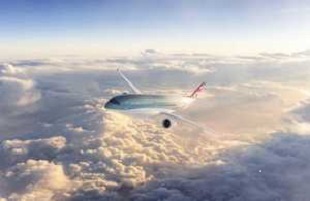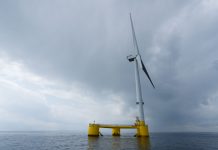Long haul flights for up to 279 passengers in a British-designed, hydrogen-fuelled plane blipped up as a prospect on airlines’ radar this morning, courtesy of the UK government.
Development body the Aerospace Technology Institute (ATI) unveiled outline concepts for an H2-burning jet developed under ‘Fly Zero’, a programme primed with £15 million of taxpayers’ money.
The designs could ultimately deliver non-stop, zero-emissions flights from London to San Francisco, or else London to Auckland with only one refuelling stop, Whitehall’s transport and business ministries believe.
Green hydrogen electrolysed from water and then compressed is the preferred power source for Fly Zero’s three options, in regional, narrow-bodied and mid-sized configurations. The ATI is working to a deadline of 2030 to deliver commercially viable, non-emitting air transport.
The group will publish final prototype designs by next spring. It promises radical changes to conventional airliner engineering.
‘Dry’ wings without tanks, super-chilled, cryogenic fuel systems, and gas turbines burning hydrogen not liquid will feature.
Fly Zero’s project director Chris Gear said: “At a time of global focus on tackling climate change our midsize concept sets out a truly revolutionary vision for the future of global air travel keeping families, businesses and nations connected, and without the carbon footprint”.
Transport Secretary Grant Shapps commented: “This pioneering design for a liquid hydrogen-powered aircraft, led by a British organisation, brings us one step closer to a future where people can continue to travel and connect but without the carbon footprint”.
“These designs could define the future of aerospace and aviation. By working with industry, we are showing that truly carbon-free flight could be possible with hydrogen a front-runner to replace conventional fossil fuels,” said Business Secretary Kwasi Kwarteng.
Today’s news comes as the Jet Zero Council, an industry-government partnership launched earlier in 2021, holds its fourth meeting. The council seeks emissions-free transatlantic flights “within a generation”. Its members include plane makers Airbus, Manchester Airports Group, Heathrow, Shell, and airlines IAG, Easyjet and LoganAir.
Earlier this year the government voiced its ambition for Britain become a world leader in the production of sustainable aviation fuel (SAF), as it launched a £15 million Green Fuel, Green Skies competition to support the early development of UK facilities capable of synthesising jet fuel from household waste, including plastics.
Separately, the Department for Transport today announced it has confirmed final funding agreements of the eight winning projects under the £15 million Green Fuel, Green Skies competition, which aims to nurture the production of sustainable aviation fuel (SAF) in the UK.
SAF is seen as a wider class of sustainable power for airlines, embracing new technologies such as avgas from forestry waste, from end-of-life plastics, and re-used cooking oils.




